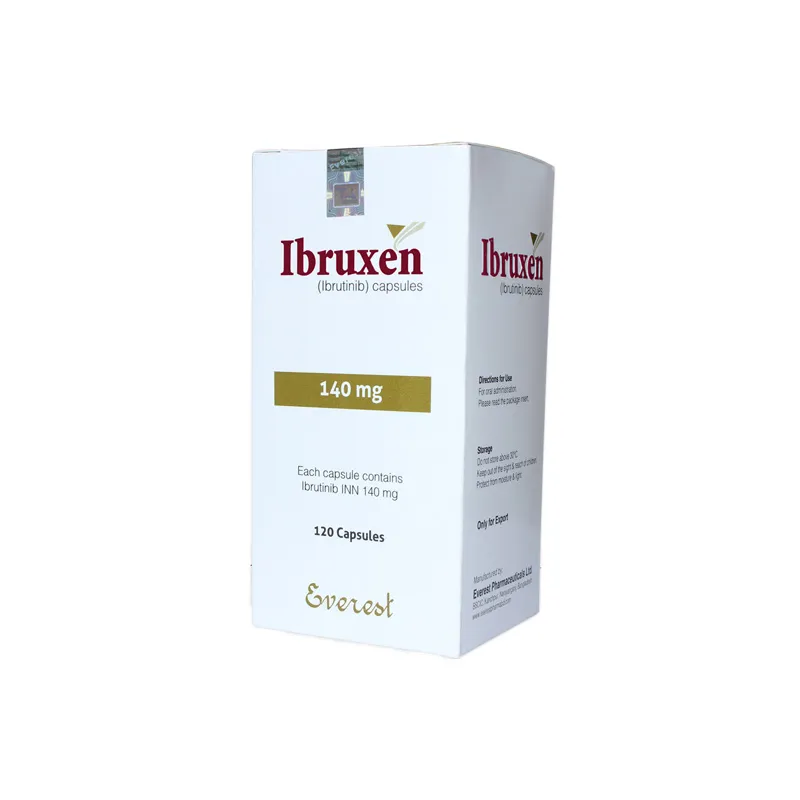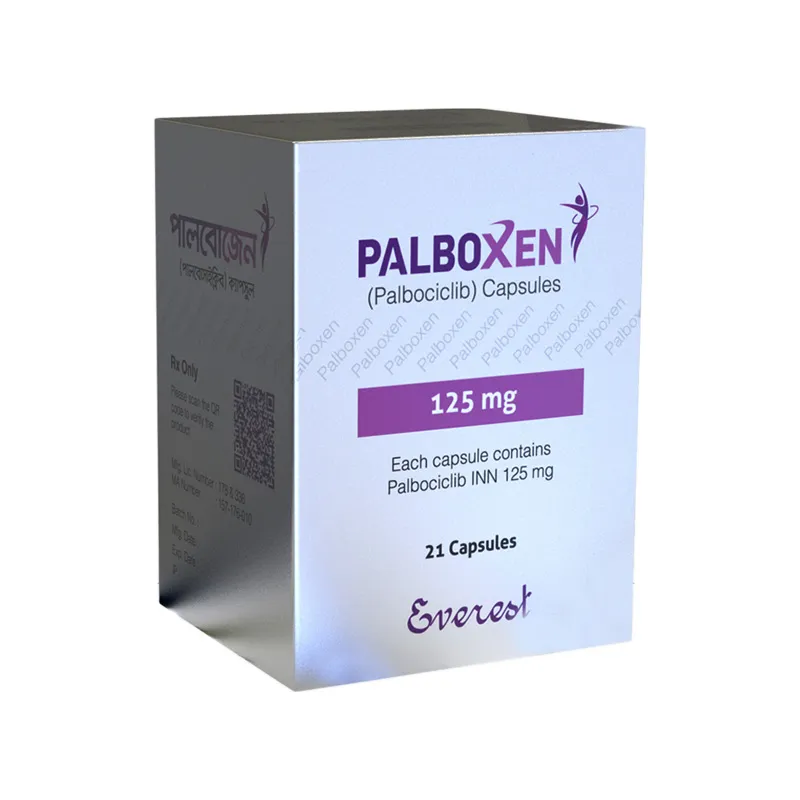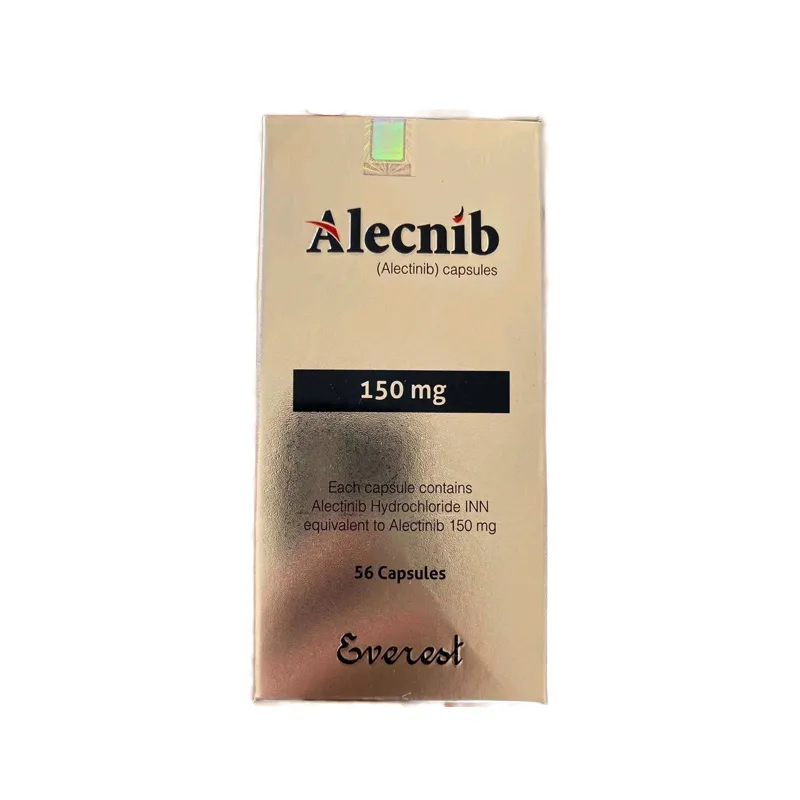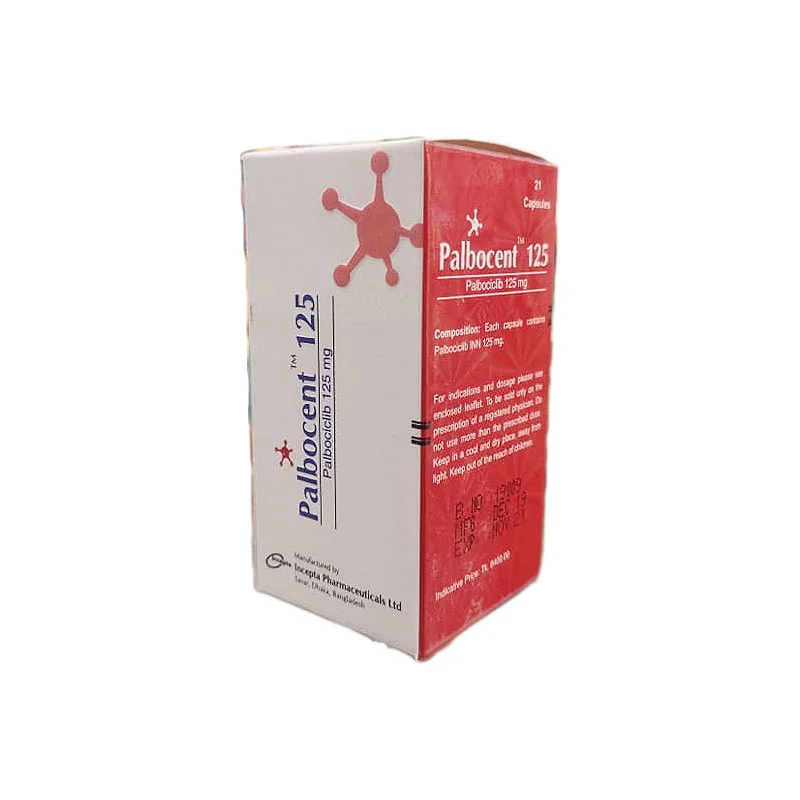Buy Ibruxen 140 mg (Ibrutinib)
Inquire NowTable of Contents
ToggleWhat is Ibruxen 140 mg (Ibrutinib)?
Ibrutinib is used:
- to treat people with mantle cell lymphoma (MCL; a fast-growing cancer that begins in the cells of the immune system) who have already been treated with at least one other chemotherapy medication,
- to treat people with chronic lymphocytic leukemia (CLL; a type of cancer that begins in the white blood cells) and small lymphocytic lymphoma (SLL; a type of cancer that begins mostly in the lymph nodes),
- to treat people with Waldenstrom’s macroglobulinemia (WM; a slow-growing cancer that begins in certain white blood cells in your bone marrow),
- to treat people with marginal zone lymphoma (MZL; a slow growing cancer that begins in a type of white blood cells that normally fights infection) who have already been treated with a certain type of chemotherapy medication,
- and to treat people with chronic graft vs host disease (cGVHD; a complication of hematopoietic stem-cell transplant [HSCT; a procedure that replaces diseased bone marrow with healthy bone marrow] that may start a while after the transplant and last for a long time) after being treated unsuccessfully with 1 or more medications.
To know more about Ibrutinib please visit MedlinePlus.
Why should you buy the generic Ibruxen online?
First of all generic Ibruxen is very affordable version of Ibrutinib for mantle cell lymphoma patients. It is a verified generic version of Imbruvica. Everest pharmaceuticals Limited manufacture this generic version in Bangladesh. It is one of the renowned pharmaceutical companies who mostly made cancer medicine in Bangladesh. After the Directorate General of Drug Administration of Bangladesh approves to manufacture Ibrutinib, they started to make it and sell it all over the world where generic medicine is allowed to use.
It is the 4th generic version of Imbruvica which is selling regularly all over the world. It is also 98% cheaper than the brand version of ibrutinib. Which cost you less than 300 dollars. To check out other Lymphoma or Leukemia medicine please visit our shop page.
COMPOSITION
Ibruxen Capsule: Each capsule contains Ibrutinib 140 mg INN.
INDICATIONS AND USAGE OF IBRUXEN
Mantle Cell Lymphoma
Ibrutinib is indicated for the treatment of patients with Mantle Cell Lymphoma (MCL) who have received at least one prior therapy.
Chronic Lymphocytic Leukemia/Small Lymphocytic Lymphoma
Ibrutinib is indicated for the treatment of adult patients with chronic lymphocytic leukemia (CLL)/ small lymphocytic lymphoma (SLL).
Chronic Lymphocytic Leukemia/Small Lymphocytic Lymphoma with 17p deletion
Ibrutinib is indicated for the treatment of patients with chronic lymphocytic leukemia (CLL)/ small lymphocytic lymphoma (SLL) with 17p deletion.
Waldenstrom Macroglobulinemia (WM)
Ibrutinib is indicated for the treatment of patients with Waldenstrom Macroglobulinemia (WM).
Marginal Zone Lymphoma
Ibrutinib is indicated for the treatment of patients with marginal zone lymphoma (MZL) who require systemic therapy and have received at least one prior anti-CD20-based therapy.
Chronic Graft versus Host Disease
Ibrutinib is indicated for the treatment of adult patients with chronic graft-versus-host disease (cGVHD) after failure of one or more lines of systemic therapy
DOSAGE AND ADMINISTRATION
Dosing Guidelines
Administer Ibrutinib orally once daily at approximately the same time each day. Swallow the capsules whole with water. Do not open, break, or chew the capsules.
Recommended Dosage
Mantle Cell Lymphoma and Marginal Zone Lymphoma
The recommended dose of Ibrutinib for MCL and MZL is 560 mg (four 140 mg capsules) orally once daily until disease progression or unacceptable toxicity.
Chronic Lymphocytic Leukemia/Small Lymphocytic Lymphoma and Waldenstrom Macroglobulinemia (WM)
The recommended dose of Ibrutinib for CLL/SLL and WM is 420 mg (three 140 mg capsules) orally once daily until disease progression or unacceptable toxicity. The recommended dose of Ibrutinib for CLL/SLL when used in combination with bendamustine and rituximab (administered every 28 days for up to 6 cycles) is 420 mg (three 140 mg capsules) orally once daily until disease progression or unacceptable toxicity.
Chronic Graft versus Host Disease
The recommended dose of Ibrutinib for cGVHD is 420 mg (three 140 mg capsules) orally once daily until cGVHD progression, recurrence of an underlying malignancy, or unacceptable toxicity. When a patient no longer requires therapy for the treatment of cGVHD, Ibrutinib should be discontinued considering the medical assessment of the individual patient.
Missed Dose
If a dose of Ibrutinib is not taken at the scheduled time, it can be taken as soon as possible on the same day with a return to the normal schedule the following day. Extra capsules of Ibrutinib should not be taken to make up for the missed dose.
CONTRAINDICATIONS
Hypersensitivity to Ibrutinib or to any of the excipients.’
WARNINGS AND PRECAUTIONS
Hemorrhage
Fatal bleeding events have occurred in patients treated with Ibrutinib. Grade 3 or higher bleeding events (intracranial hemorrhage [including subdural hematoma], gastrointestinal bleeding, hematuria, and post procedural hemorrhage) have occurred in up to 6% of patients. Bleeding events of any grade, including bruising and petechiae, occurred in approximately half of patients treated with Ibrutinib. The mechanism for the bleeding events is not well understood.
Ibrutinib may increase the risk of hemorrhage in patients receiving antiplatelet or anticoagulant therapies and patients should be monitored for signs of bleeding. Consider the benefit-risk of withholding Ibrutinib for at least 3 to 7 days pre and post-surgery depending upon the type of surgery and the risk of bleeding.
Infections
Fatal and non-fatal infections (including bacterial, viral, or fungal) have occurred with Ibrutinib therapy. Grade 3 or greater infections occurred in 14% to 29% of patients. Cases of progressive multifocal leukoencephalopathy (PML) and Pneumocystis jirovecii pneumonia (PJP) have occurred in patients treated with Ibrutinib. Consider prophylaxis according to standard of care in patients who are at increased risk for opportunistic infections. Monitor and evaluate patients for fever and infections and treat appropriately.
Cytopenias
Treatment-emergent Grade 3 or 4 cytopenias including neutropenia (range, 13 to 29%), thrombocytopenia (range, 5 to 17%), and anemia (range, 0 to 13%) based on laboratory measurements occurred in patients with B-cell malignancies treated with single agent Ibrutinib. Monitor complete blood counts monthly.
Cardiac Arrhythmias
Fatal and serious cardiac arrhythmias have occurred with Ibrutinib therapy. Grade 3 or greater ventricular tachyarrhythmias occurred in 0 to 1% of patients, and Grade 3 or greater atrial fibrillation and atrial flutter occurred in 0 to 6% of patients. These events have occurred particularly in patients with cardiac risk factors, hypertension, acute infections, and a previous history of cardiac arrhythmias.
Periodically monitor patients clinically for cardiac arrhythmias. Obtain an ECG for patients who develop arrhythmic symptoms (e.g., palpitations, lightheadedness, syncope, chest pain) or new onset dyspnea. Manage cardiac arrhythmias appropriately, and if it persists, consider the risks and benefits of Ibrutinib treatment and follow dose modification guidelines.
Hypertension
Hypertension (range, 6 to 17%) has occurred in patients treated with Ibrutinib with a median time to onset of 4.6 months (range, 0.03 to 22 months). Monitor patients for new onset hypertension or hypertension that is not adequately controlled after starting Ibrutinib. Adjust existing anti-hypertensive medications and/or initiate anti-hypertensive treatment as appropriate.
Second Primary Malignancies
Other malignancies (range, 3 to 16%) including non-skin carcinomas (range, 1 to 4%) have occurred in patients treated with Ibrutinib. The most frequent second primary malignancy was non-melanoma skin cancer (range, 2 to 13%).
Tumor Lysis Syndrome
Tumor lysis syndrome has been infrequently reported with Ibrutinib therapy. Assess the baseline risk (e.g., high tumor burden) and take appropriate precautions. Monitor patients closely and treat as appropriate.
Embryo-Fetal Toxicity
Based on findings in animals, Ibrutinib can cause fetal harm when administered to a pregnant woman. Administration of Ibrutinib to pregnant rats and rabbits during the period of organogenesis caused embryo-fetal toxicity including malformations at exposures that were 2-20 times higher than those reported in patients with hematologic malignancies.
Advise women to avoid becoming pregnant while taking Ibrutinib and for 1 month after cessation of therapy. If this drug is used during pregnancy or if the patient becomes pregnant while taking this drug, the patient should be apprised of the potential hazard to a fetus.
ADVERSE REACTIONS
The following adverse reactions are discussed in more detail in other sections of the labeling: Hemorrhage, Infections, Cytopenias, Atrial Fibrillation, Hypertension, Second Primary Malignancies and Tumor Lysis Syndrome.
The most commonly occurring adverse reactions (> 20%) were thrombocytopenia, diarrhea, neutropenia, anemia, fatigue, musculoskeletal pain, peripheral edema, upper respiratory tract infection, nausea, bruising, dyspnea, constipation, rash, abdominal pain, vomiting and decreased appetite. The most common Grade 3 or 4 non-hematological adverse reactions (> 5%) were pneumonia, abdominal pain, atrial fibrillation, diarrhea, fatigue, and skin infections.
DRUG INTERACTIONS
Effect of CYP3A Inhibitors on Ibrutinib
Ibrutinib is primarily metabolized by cytochrome P450 enzyme 3A (CYP3A). In healthy volunteers, co-administration of ketoconazole, a strong CYP3A inhibitor, increased Cmax and AUC of Ibrutinib by 29-and 24-fold, respectively. The highest Ibrutinib dose evaluated in clinical trials was 12.5 mg/kg (actual doses of 840— 1400 mg) given for 28 days with single dose AUC values of 1445 ± 869 ng•hr/mL which is approximately 50% greater than steady state exposures seen at the highest indicated dose (560 mg).
Avoid concomitant administration of Ibrutinib with strong or moderate inhibitors of CYP3A. For strong CYP3A inhibitors used short-term (e.g., antifungals and antibiotics for 7 days or less, e.g., ketoconazole, itraconazole, voriconazole, posaconazole, clarithromycin, telithromycin) consider interrupting Ibrutinib therapy during the duration of inhibitor use. Avoid strong CYP3A inhibitors that are needed chronically. If a moderate CYP3A inhibitor must be used, reduce the Ibrutinib dose. Patients taking concomitant strong or moderate CYP3A4 inhibitors should be monitored more closely for signs of Ibrutinib toxicity.
Avoid grape fruit and Seville oranges during Ibrutinib treatment, as these contain moderate inhibitors of CYP3A.
Effect of CYP3A Inducers on Ibrutinib
Administration of Ibrutinib with rifampin, a strong CYP3A inducer, decreased Ibrutinib Cmax and AUC by approximately 13 & 10 fold, respectively. Avoid concomitant use of strong CYP3A inducers (e.g., carbamazepine, rifampin, phenytoin, and St.John’sWort). Consider alternative agents with less CYP3A induction.
USE IN SPECIFIC POPULATIONS
Pregnancy
Ibrutinib, a kinase inhibitor, can cause fetal harm based on findings from animal studies. In animal reproduction studies, administration of Ibrutinib to pregnant rats and rabbits during the period of organogenesis at exposures up to 2-20 times the clinical doses of 420-560 mg daily produced embryofetal toxicity including malformations. If Ibrutinib is used during pregnancy or if the patient becomes pregnant while taking Ibrutinib, the patient should be apprised of the potential hazard to the fetus.
The estimated background risk of major birth defects and miscarriage for the indicated population is unknown.
Lactation
There is no information regarding the presence of Ibrutinib or its metabolites in human milk, the effects on the breast fed infant, or the effects on milk production.
Females and Males of Reproductive Potential
Pregnancy Testing
Verify the pregnancy status of females of reproductive potential prior to initiating Ibrutinib therapy.
Contraception
Females
Advise females of reproductive potential to avoid pregnancy while taking Ibrutinib and for up to 1 month after ending treatment. If this drug is used during pregnancy or if the patient becomes pregnant while taking this drug, the patient should be informed of the potential hazard to a fetus.
Males
Advise men to avoid fathering a child while receiving Ibrutinib, and for 1 month following the last dose of Ibrutinib.
Pediatric Use
The safety and effectiveness of Ibrutinib in pediatric patients has not been established.
Geriatric Use
Of the 905 patients in clinical studies of Ibrutinib, 62% were > 65 years of age, while 21% were >75 years of age. No overall differences in effectiveness were observed between younger and older patients. Anemia (all grades) and Grade 3 or higher pneumonia occurred more frequently among older patients treated with Ibrutinib.
Hepatic Impairment
Ibrutinib is metabolized in the liver. In a hepatic impairment study, data showed an increase in Ibrutinib exposure. The safety of Ibrutinib has not been evaluated in cancer patients with mild to severe hepatic impairment by Child-Pugh criteria. Monitor patients for signs of Ibrutinib toxicity and follow dose modification guidance as needed. It is not recommended to administer Ibrutinib to patients with moderate or severe hepatic impairment.
Plasmapheresis
Management of hyperviscosity in WM patients may include plasmapheresis before and during treatment with Ibrutinib. Modifications to Ibrutinib dosing are not required.
OVERDOSAGE
There is no specific experience in the management of Ibrutinib over dose in patients. One healthy subject experienced reversible Grade 4 hepatic enzyme increases (AST and ALT) after a dose of 1680 mg. Closely monitor patients who ingest more than the recommended dosage and provide appropriate supportive treatment.
CLINICAL PHARMACOLOGY
Mechanism of Action
Ibrutinib is a small-molecule inhibitor of BTK. Ibrutinib forms a covalent bond with a cysteine residue in the BTK active site, leading to inhibition of BTK enzymatic activity. BTK is a signaling molecule of the B-cell antigen receptor (BCR) and cytokine receptor pathways. BTK’s role in signaling through the B-cell surface receptors results in activation of pathways necessary for B-cell trafficking, chemotaxis, and adhesion. Nonclinical studies show that Ibrutinib inhibits malignant B-cell proliferation and survival in vivo as well as cell migration and substrate adhesion in vitro.
Pharmacodynamics
In patients with recurrent B-cell lymphoma > 90% occupancy of the BTK active site in peripheral blood mononuclear cells was observed up to 24 hours after Ibrutinib doses of > 2.5 mg/kg/day (> 175 mg/day for average weight of 70 kg).
At a single dose 3 times the maximum recommended dose (1680 mg), Ibrutinib did not prolong the QT interval to any clinically relevant extent.
Pharmacokinetics
Ibrutinib exposure increases with doses up to 840 mg (1.5 times the maximum approved recommended dosage) in patients with B-cell malignancies. The mean steady-state AUC (% coefficient of variation) observed in patients at 560 mg with MCL is 865 (69%) ng.h/mL and with MZL is 978 (82%) ng.h/mL, and in patients at 420 mg with CLL/SLL is 708 (71 %) ng.h/mL, with WM is 324 (48%) ng.h/mL, and with cGVHD is 1159 (50%) ng.h/mL. Steady-state concentrations of ibrutinib without CYP3A inhibitors were achieved with an accumulation ratio of 1 to 1.6 after 1 week of multiple daily doses of 420 mg or 560 mg.
Absorption
Absolute bioavailability of Ibrutinib in fasted condition was 2.9% (90% CI: 2.1, 3.9) in healthy subjects. Ibrutinib is absorbed after oral administration with a median Tmax of 1 hour to 2 hours. The administration of Ibrutinib with a high-fat and high-calorie meal (800 calories to 1,000 calories with approximately 50% of total caloric content of the meal from fat) increased Ibrutinib Cmax by 2- to 4-fold and AUC by approximately 2-fold, compared with administration of Ibrutinib after overnight fasting. In vitro studies suggest that Ibrutinib is not a substrate of p-glycoprotein (P-gp) or breast cancer resistance protein (BCRP).
Distribution
Reversible binding of Ibrutinib to human plasma protein in vitro was 97.3% with no concentration dependence in the range of 50 ng/mL to 1000 ng/mL. The volume of distribution (Vd) was 683 L, and the apparent volume of distribution at steady state (Vd,ss/F) was approximately 10,000 L.
PHARMACEUTICAL INFORMATION
Storage Conditions
Store Ibrutinib between 20°C and 25°C (68°F and 77°F); excursions permitted between 15°C and 30°C (59°F and 86°F), protect from light. Keep Ibrutinib out of the reach and sight of children. Dispensed only in original container and do not use if seal over bottle opening is broken or missing.
How Supplied
Ibruxen Capsule: Each child-resistant HDPE container contains 120 capsules and one packet silica gel.
Buy Ibruxen 140 mg Online
Are you interested to know the price of Ibruxen 140 mg? Don’t worry. 100 Meds can help you to find reliable and verified medicine at affordable cost. Please contact our support team by using email, whatsapp or wechat. Even you can contact our facebook page.
You must be logged in to post a review.






Reviews
There are no reviews yet.